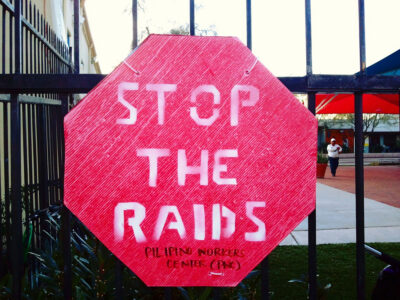Interior Enforcement

United States Agrees to Settle Lawsuit Alleging Wrongful Deportation
Washington D.C. – After more than two years of litigation, the U.S. government has agreed to settle a lawsuit filed by Leonel Ruiz on behalf of his minor daughter, E.R. The suit alleged that in 2011, U.S. Customs and Border Protection (CBP), a component of the Department of Homeland Security (DHS),… Read More

Understanding Trust Acts, Community Policing, and “Sanctuary Cities”
The term “sanctuary city” is often used incorrectly to describe trust acts or community policing policies that limit entanglement between local police and federal immigration authorities. Here are the facts. Read More

Motions to Suppress in Removal Proceedings: A General Overview
This Practice Advisory provides a general overview of motions to suppress, a tool used to prevent the introduction of evidence obtained by federal immigration officers in violation of the Fourth Amendment, Fifth Amendment, and related provisions of federal law. Read More

Motions to Suppress in Removal Proceedings: Cracking Down on Fourth Amendment Violations
This Practice Advisory discusses some of the legal issues that may arise when noncitizens in removal proceedings move to suppress evidence obtained through constitutional violations by state and local officers seeking to enforce immigration law. Read More

Enforcement Overdrive: A Comprehensive Assessment of ICE’s Criminal Alien Program
This examination of the Criminal Alien Program's outcomes from fiscal years 2010 to 2013 offers important insights into CAP’s operations over time and its potential impact on communities moving forward. Read More

Reports of Additional Round-Ups of Refugees Met with Strong Condemnation
Reuters reported late on Thursday that the Obama Administration will launch a new round of immigration raids targeting Central American women and children following their last round-ups in January. The Reuters report says that Immigration and Customs Enforcement (ICE) is “planning a month-long series of raids in May and… Read More

Criminal Alien Program (CAP) FOIA Documents
American Immigration Council and AILA’s Connecticut chapter initially sought records related to CAP through a FOIA request to ICE in December 2011. When ICE refused to release records responsive to the request, Plaintiffs filed suit under FOIA for declaratory and injunctive relief to compel the disclosure and release of agency records improperly withheld by DHS and its component ICE Read More

F- P- v. Holder – Ninth Circuit
Long used in criminal trials, motions to suppress can lead to the exclusion of evidence obtained by the government in violation of the Fourth Amendment, Fifth Amendment, or related provisions of federal law. While the immediate purpose of filing a motion to suppress is to prevent the government from meeting its burden of proof, challenges to unlawfully obtained evidence can also deter future violations by law enforcement officers and thereby protect the rights of other noncitizens. The Supreme Court held in INS v. Lopez-Mendoza, 468 U.S. 1032 (1984), that motions to suppress evidence under the Fourth Amendment in immigration proceedings should be granted only for “egregious” violations or if violations became “widespread.” Despite this stringent standard, noncitizens have prevailed in many cases on motions to suppress. Read More

Over 150 Groups Demand Obama Administration Stop Immigration Raids
Last month the Department of Homeland Security (DHS) announced that since the end of January they have been conducting “Operation Border Guardian,” which has been focusing on the removal of individuals who came to the United States as unaccompanied children after January, 1, 2014, but are now 18 or… Read More

U.S. Sentencing Commission Proposes Further Criminalizing Migrants
At a time when there is a great deal of national attention being placed on criminal-justice reform, it is troubling that the U.S. Sentencing Commission (USSC) is now proposing, new amendments to Federal Sentencing Guidelines, which could lead to increased sentences for those convicted of “Unlawfully Entering or Remaining… Read More
Make a contribution
Make a direct impact on the lives of immigrants.
